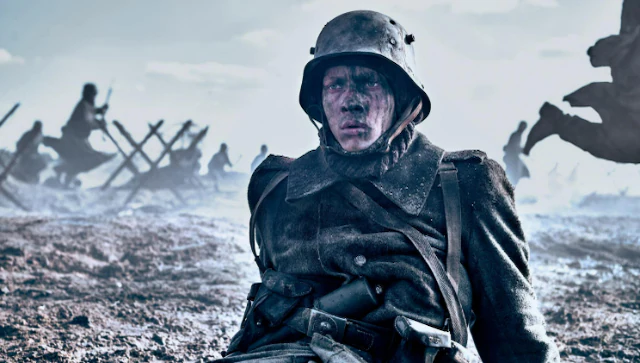

Most people would agree that All Quiet on the Waterfront is the most brutal and humane critique of the pointless path.
This year, there is no need to hold an Oscars ceremony. All the major awards, with the exception of best actress (boys go to war, not girls), ought to go to Edward Berger’s German instant classic All Quiet on the Western Front (in German: Im Westen nichts Neues). The film, which is based on a 1929 novel by Erich Maria Remarque, puts us right into the trenches with the soldiers during World War I, giving us no room for comfort. There is no respite in distance.
In some cases we feel so near the brutality that it turns out to be difficult to relax. Dunkirk, directed by Christopher Nolan in 2017, threw us into trenches. This one is far superior. We are so close to the naive German soldier Paul Baumer (Felix Kammerer) that we can smell his fear of death, hunger, loneliness, and that creeping sense of this-couldn’t-be-happening-to-me unreality as he traverses the death valley from one battlefield to another.
All Quiet On The Western Front has some extremely disturbing images. On the off chance that you are unwilling to violence, this film might disturb you profoundly. However, the significance of this film cannot be overstated, particularly at this time, when Ukraine is ferociously fighting the Russian bullies for its sovereignty.
Despite its antiwar message, it highlights the futility of young boys fighting for…what? While the message is at the heart of this unquestionable masterpiece, the inhumanity of hurling mere boys to their deaths is what we take away from it.
This is the most brutal and self-serving form of barbarism. For what reason are these young men shipped off their merciless passing realizing that the fight they were battling filled no need but to permit legislators to burn through billions on weaponry which are best passed on to rust in harmony?
Legs and arms are frequently blown off, and director Edward Berger doesn’t spare us any of the small details. However, this is not the primary focus. As World War I sends soldiers on a path toward annihilation, the physical slaughter is just one aspect of their suffering. And who cares about the thousands of casualties in battle? Absolutely not the senior generals who sit in opulent luxury and indulge in gourmet food while thousands of foot soldiers starve and die (not from starvation, but from a far more brutal death).
The army generals’ portrayal, in my opinion, is not particularly accurate. I’d rather concentrate on the constant battle for survival in the trenches. The most remarkable of these minutes is when Paul is caught in the channel with an aggressor. In self-defense, he stabs and nearly kills the enemy, then watches the soldier splutter and shake. Paul feels a great deal of regret. I could hear his aggravation. A seriously wounded soldier takes the fork from his soup tray and repeatedly stabs himself in the neck, which is my second favorite moment of battle violence.
All Peaceful On The Waterfront is seemingly the most accommodating and severe incrimination of the purposelessness of the way. If you really think it’s brave to give up your life on the battlefield, you should do it. It is an unparalleled achievement that renders all of the great films that were released in 2022 about love, friendship, sexuality, and marriage seem so insignificant.
A special mention of the epic cinematography of James Friend: The camera zooms in on each soldier’s indescribable suffering while standing back to observe the barbarism on the battlefield. What are they doing?
Yes, this movie features a stolen rooster and a ladies’ scarf. Even though the world is going insane, these are the times when we smile.